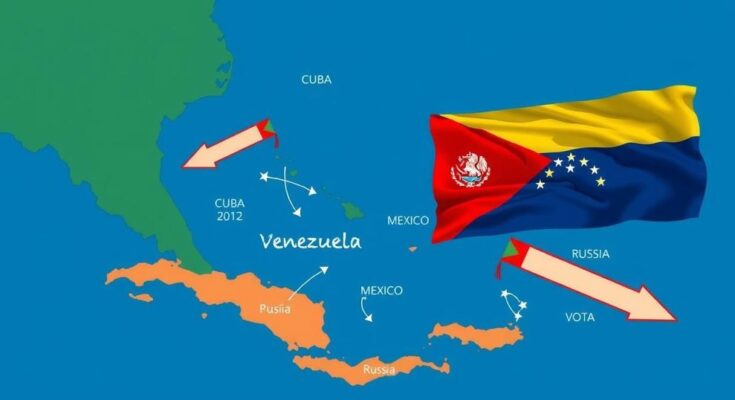Mexico has increasingly backed Cuba’s dictatorship, positioning itself alongside Russia and Venezuela, as it supplies vital resources despite its own domestic turmoil. The administration has been criticized for neglecting human rights in favor of diplomatic relations with authoritarian regimes, raising questions about its democratic values.
Mexico has recently aligned itself with nations such as Russia and Venezuela in supporting the longstanding dictatorship in Cuba, raising concerns about its commitment to democratic values. Historically, the Soviet Union heavily subsidized Cuba during its communist regime, infusing over $29 billion in assets, which Russia later forgave. In the 1990s, Venezuela emerged as a significant benefactor, providing Cuba with approximately $35 billion in oil over 15 years. Currently, with Venezuela in an economic crisis, Mexico has stepped in to offer assistance through the supply of essential goods, oil, and food, effectively becoming Cuba’s latest lifeline amidst its ongoing economic collapse. Mexico’s position is reflected in its recent diplomatic engagement, which critics term as nonsensical. For instance, in 2023, it attempted to leverage its cooperation on migration issues to press the United States for renewed dialogue with Cuba. Furthermore, the Mexican government declined an invitation to the 2022 Summit of the Americas, protesting against the exclusion of Cuba and other authoritarian regimes. Despite facing domestic turmoil marked by significant violence and crime, Mexico’s President Claudia Sheinbaum has prioritized aiding the Cuban regime. In 2023, the previous administration, under Andrés Manuel López Obrador, committed to supplying a record 5.4 million barrels of oil to Cuba, valued at $391 million, in what is framed as a gesture of solidarity with a government that has imprisoned 1,100 political dissidents and has not conducted free elections for over six decades. Furthermore, Sheinbaum’s statements have implied a willingness to fulfill all requests from the Cuban government, potentially highlighting contradictions in Mexico’s foreign policy regarding democratic principles, particularly when the aid is not contingent upon reforms in Cuba. Additionally, the inefficiencies and corruption within the Cuban regime are systemic problems that are seldom addressed, which continue to hamper the country’s economic prospects despite substantial foreign aid. Meanwhile, the support for Cuba comes at a cost to Mexican citizens, as evidenced by widespread blackouts in Mexico that echo the circumstances preceding Venezuela’s economic collapse. Mexico has transitioned from merely providing humanitarian aid to becoming a critical supplier of oil to Cuba, surpassing previous benefactors like Russia. The Mexican government’s support is seen as detrimental to its democratic foundations, as it moves towards increased military involvement in public security and diminished transparency within governmental operations. Critics argue that true support for the Cuban populace would necessitate conditioning aid on the liberation of political prisoners, establishment of free elections, and an end to human rights abuses. Countries such as Cuba, Venezuela, and Nicaragua continue to sustain their authoritarian regimes not solely through oppressive measures but also through the support of nations including Mexico that do not align with democratic ideals while enjoying the privileges that democracy affords.
The relationship between Mexico and Cuba has experienced shifts over the decades, particularly influenced by historical dependencies on foreign support. During the Cold War, the Soviet Union played a pivotal role in sustaining Cuba’s communist government, contributing substantial financial and military support. Later, Venezuela emerged as a critical ally under Hugo Chavez, providing oil and financial assistance. Today, as Venezuela grapples with economic devastation, Mexico’s involvement represents a significant transition in foreign aid dynamics towards Cuba. This support raises questions regarding Mexico’s domestic challenges and its stance on human rights and democracy.
In summary, Mexico’s current support for Cuba’s regime mirrors past alliances established during the Cold War and poses significant implications for its own democratic integrity. Critics contend that the aid should be conditional on the improvement of human rights and the establishment of democratic processes in Cuba. This situation not only highlights the complexities of international relations but also reflects Mexico’s shifting priorities under its current administration.
Original Source: thehill.com




